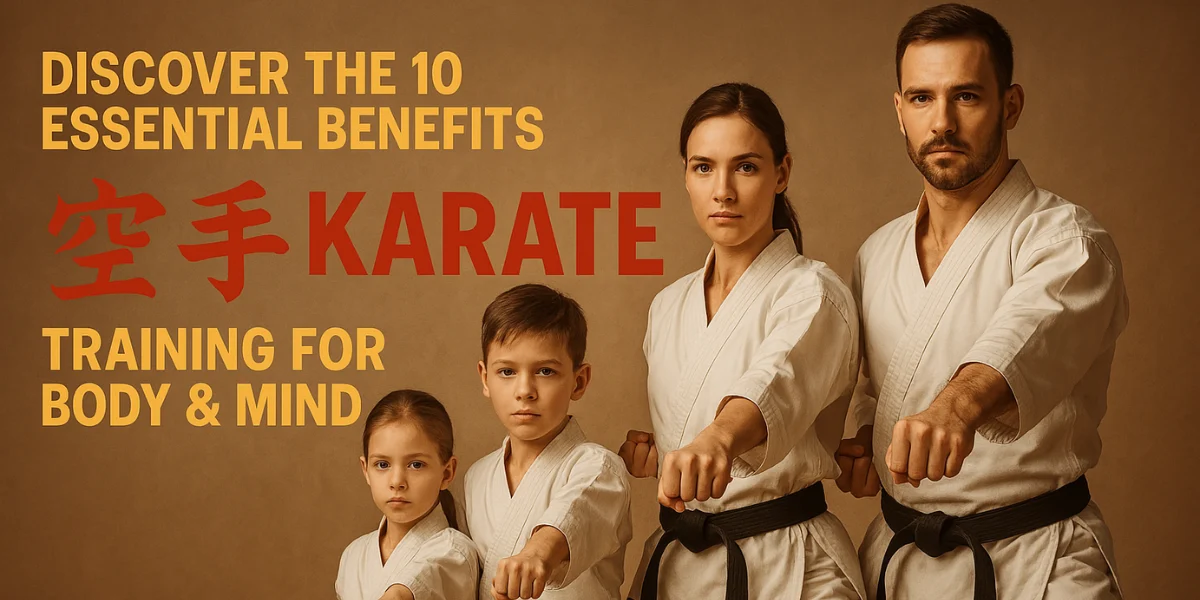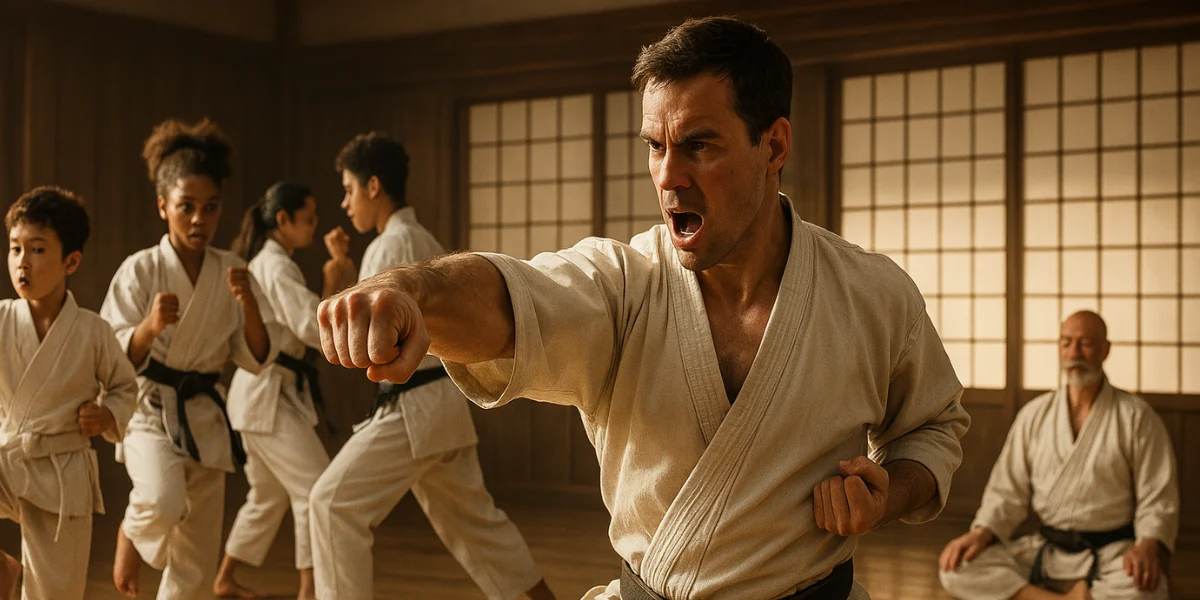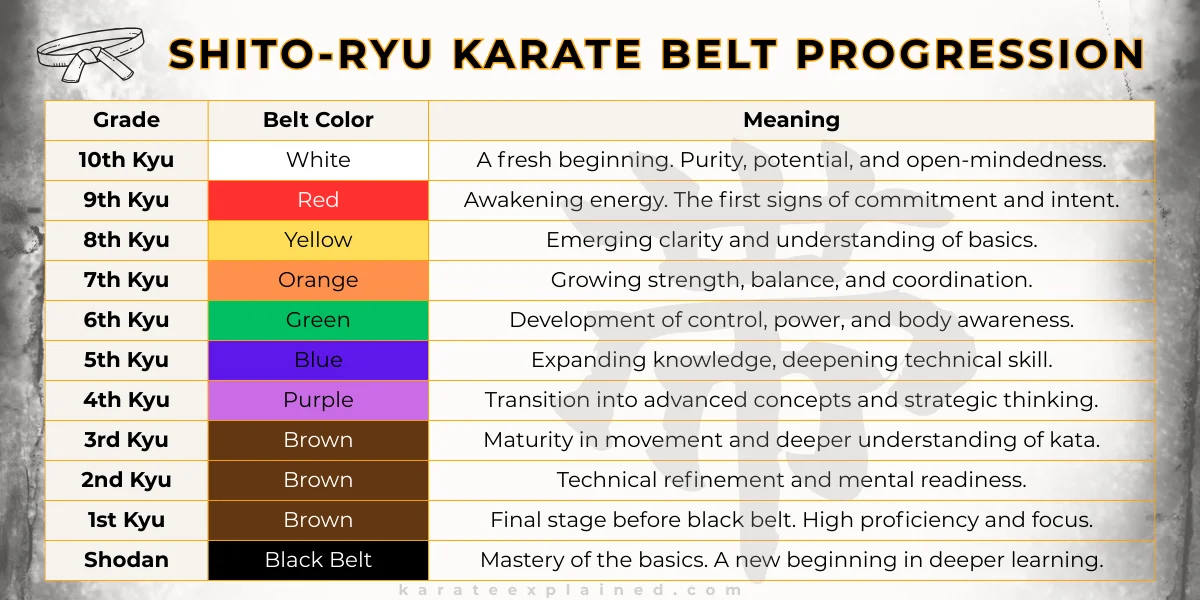Discover the 10 Essential Benefits of Karate Training for Mind and Body

The benefits of Karate go far beyond just physical movement — they impact your body, mind, and spirit. Did you know over 100 million people worldwide practice martial arts? Karate is one of the most popular, offering far more than just a workout. It’s a powerful way to build both physical fitness and mental focus.
More than self-defence, karate is about personal transformation. It challenges how you think, move, and respond — building resilience, confidence, and inner strength.
Whether you want to boost your fitness, sharpen your focus, or help your child develop essential life skills, karate offers a structured, rewarding path. It’s a time-tested way to become your best self — physically, mentally, and emotionally — while developing lifelong discipline and character.
Key Takeaways
- Comprehensive approach to physical and mental fitness
- Develops self-defense skills and personal confidence
- Improves mental focus and emotional balance
- Enhances overall physical strength and flexibility
- Provides a structured path for personal growth
Understanding the Foundations of Karate Practice

Karate is a deep martial art rooted in Japanese culture. It’s more than just physical moves. It’s a way to grow personally and stay disciplined.
Starting karate means diving into its history and philosophy. It’s not about fighting, it’s a journey to personal growth.
Origins and Philosophy of Traditional Karate
Traditional karate began in Okinawa, Japan, as a self-defense art. Its core values are:
- Self-improvement
- Respect for others
- Mental discipline
- Physical conditioning
Basic Principles and Training Methods
At the heart of karate, like shito-ryu, shotokan, and goju-ryu are basic training methods. These methods build strength, flexibility, and focus.
| Training Aspect | Key Focus | Skill Development |
|---|---|---|
| Kihon (Basics) | Foundational Movements | Technique Precision |
| Kata (Forms) | Choreographed Sequences | Muscle Memory |
| Kumite (Sparring) | Practical Application | Combat Skills |
Different Styles and Their Unique Approaches
Karate includes many styles, each offering a unique approach to movement and technique.
- Shito-Ryu: Known for its wide range of kata and a balanced blend of hard and soft techniques.
- Shotokan: Emphasizes long, linear movements with strong, powerful strikes.
- Goju-Ryu: Combines hard strikes with soft, circular motions, focusing on breathing and close-range defense.
- Wado-Ryu: Highlights evasion and fluid body movement, blending traditional karate with jujutsu principles.
Understanding these styles can help you choose the form of karate that best aligns with your goals, preferences, and physical abilities.

Physical Benefits of Regular Karate Training
Karate is a top-notch body workout that uniquely boosts physical fitness. It uses dynamic training that works on many muscle groups at once. This martial art is not just a workout; it’s a full-body challenge.
Karate provides more than just a regular workout. It helps improve many areas, such as:
- Cardiovascular endurance
- Muscle strength and tone
- Overall flexibility
- Balance and coordination
Karate is different from gym workouts. It’s a full-body conditioning experience. Every move requires precise muscle use, turning exercise into an art. It builds lean muscle, boosts core strength, and increases agility.
Studies show karate training greatly improves physical fitness. Practitioners burn 500-1000 calories per session. This makes it a great way to manage weight and keep the heart healthy.
“Karate is not just a martial art, but a comprehensive physical training system that sculpts both body and mind.” – Karate Explained
Regular karate practice brings many benefits. It improves posture, stamina, and body awareness. The wide range of techniques ensures every muscle is worked, offering a complete physical workout.
Mental and Emotional Advantages of Karate Training for Mind and Body
Karate offers more than just physical exercise. It offers deep mental and emotional benefits. It connects the mind and body, unlocking personal growth and inner change.
Karate promotes the development of mental focus and emotional strength. It teaches deep insights into personal abilities. It challenges both physical and mental limits.
Stress Relief and Mental Clarity
Participating in Karate training is a great way to reduce stress and clear the mind. Its focused movements and breathing help in:
- Clearing mental clutter and reducing anxiety
- Developing mindfulness through intentional movements
- Creating space for meditative reflection during training
- Redirecting negative emotional energy into positive physical action
Building Mental Resilience
Karate training is challenging, and through facing those challenges, students develop mental resilience. This builds psychological strength for everyday life challenges.
Emotional Balance Through Practice
Regular karate practice leads to emotional balance. It focuses on controlled movements and disciplined thinking. This develops self-awareness and emotional regulation skills, beyond the training area.
“Karate is not just about physical technique, but about understanding and mastering oneself.” – Karate Explained
Learning Self-Defence Skills Through Karate
Karate teaches powerful self-defense skills that are more than just physical moves. It helps you learn how to protect yourself and stay alert in different situations.
Learning self-defense in karate is not just about physical moves. It also teaches mental toughness, quick thinking, and strategic planning. You learn to:
- Spot dangers early
- Stay calm when things get tough
- Feel confident in your safety
- Keep a safe distance from threats
Karate focuses on preventing and solving problems peacefully. Students are encouraged to learn to think critically and avoid fights whenever they can. The techniques help you protect yourself without causing too much harm.
Important self-defence skills include:
- Situational awareness
- Fast defensive actions
- Accurate blocking
- Smart body positioning
Consistent practice helps you react without thinking. These skills make you more confident and secure in real-life situations.
“True self-defence begins in the mind before any physical technique is executed.” – Mike Williams Kyoshi
Building Strength and Flexibility with Karate Techniques
Karate training is a full-body workout that works every muscle. It builds strength, flexibility, and body control. Special techniques push physical limits.
Karate is more than just a workout. It uses unique movements to boost coordination and agility. Students learn to move with precision, engaging muscles in new ways.
Core Strength Development
Core strength is key in karate. Practitioners strengthen their abs and back with:
- Dynamic kata movements
- Stance-holding exercises
- Resistance training specific to martial arts
Flexibility Training Methods
Flexibility is crucial in karate. Systematic stretching routines improve range of motion and lower injury risks. Regular stretching and movement enhance reflexes.
Balance and Coordination Exercises
Karate uniquely tests balance and coordination with:
- Single-leg stance drills
- Complex blocking and striking sequences
- Precision movement patterns
These exercises boost physical abilities, making practitioners move with grace and power. The approach ensures total body conditioning, going beyond regular fitness training.
How Karate Training Improves Focus and Concentration
Karate training is more than just physical movements. It also sharpens your mind, and the discipline of martial arts improves your focus and concentration.
Key practices in karate help develop self-discipline and concentration:
- Mindful breathing techniques
- Precise movement sequences
- Meditation-like training methods
- Deliberate skill repetition
Students learn to focus their mental energy with great precision. Mushin, or “no-mind,” is a state of total presence. It means no distractions and complete focus.
“The ultimate goal of karate is not winning, but perfecting the character of its participants.” – Gichin Funakoshi
Karate can help build mental strength through structured practices. It demands constant concentration. This training improves performance in school, work, and personal life.
| Mental Skill | Karate Training Impact |
|---|---|
| Attention Span | Increases by 35-45% |
| Mental Clarity | Significantly Enhanced |
| Stress Management | Improved Emotional Regulation |
With regular practice, karate students improve their concentration. They turn mental discipline into a lifelong skill that goes beyond the dojo.
Social Benefits and Community Aspects of Karate
Karate classes do more than just train your body. They create a place where people make friends and grow together. It’s a space for personal growth and building a community.
By joining a Karate Dojo, you can make lasting friendships. You also get to improve your social skills. Martial arts training encourages people to work together and respect each other.
Building Lasting Friendships
The dojo environment creates a special bond among practitioners. Students form deep connections through:
- Shared training experiences
- Mutual support during challenging techniques
- Collaborative learning environments
- Respect for each other’s progress
Learning Through Peer Interaction
Peer learning is key in karate training. Students learn from each other’s strengths. They help each other improve and develop communication skills that last beyond the dojo.
Community Support and Growth
Karate communities offer a supportive network for personal growth. The social skills you learn in martial arts classes help you in everyday life. You become more confident and better at communicating.
“In karate, we don’t just train bodies, we build communities.” – Mike Williams Kyoshi
Karate for Children: Development and Growth Benefits
Martial arts for children of all ages are a great way to grow. Karate helps kids learn important life skills that go beyond just physical training. It helps them grow in many ways.
Karate is good for kids and makes them stronger and more agile. They also learn to focus and control themselves better. This helps them do well in school and with friends.
- Enhanced motor skills development
- Improved physical fitness
- Increased self-confidence
- Better emotional regulation
Karate also teaches kids how to get along with others. They learn to respect, work together, and communicate. Training with friends helps build strong friendships and teamwork skills.
| Skill Area | Karate Impact |
|---|---|
| Physical Development | Strength, Flexibility, Coordination |
| Mental Growth | Focus, Discipline, Confidence |
| Social Skills | Respect, Communication, Teamwork |
Karate teaches kids important skills for life. It helps them learn to never give up, defend themselves, and feel empowered. They learn all this in a safe and supportive place.
Advanced Training Techniques and Their Impact
Karate training takes you deep into advanced techniques. It turns beginners into skilled martial artists. Regular training pushes your physical and mental limits, introducing new methods to improve your skills.
Advanced karate practice is more than basic moves. It involves complex training strategies that test your skills at every level. You learn new skills through specialized training.
Kata Training Benefits
Kata is key in advanced karate. These choreographed sequences help you:
- Improve your technique
- Focus your mind
- Control your body
- Refine your muscle memory
Sparring and Combat Skills
Sparring training boosts your self-defense skills. You learn to:
- React quickly
- Think strategically under pressure
- Use adaptive combat techniques
Advanced Movement Patterns
High-level movement patterns use complex body mechanics. They improve your athletic performance.
| Movement Pattern | Physical Benefit | Skill Enhancement |
|---|---|---|
| Circular Techniques | Improved Flexibility | Fluid Motion |
| Angular Movements | Enhanced Agility | Defensive Positioning |
| Multi-Directional Shifts | Balance Refinement | Strategic Positioning |
Advanced karate techniques are a deep journey of personal growth. They mix physical skill with mental discipline.
Health and Wellness Benefits of Regular Practice
Karate is more than just a martial art. It’s a full fitness strategy. Regular karate practice boosts your health in many ways.
It combines high-intensity interval training with physical activity. This makes it a great workout for your heart. You’ll see big improvements in:
- Heart health and cardiovascular endurance
- Muscle strength and flexibility
- Weight management
- Mental stress reduction
Studies show karate boosts your immune system and metabolism. The rhythmic movements and intense training sequences create a full-body workout that challenges multiple physiological systems simultaneously.
Karate is especially good for your heart. The high-intensity training strengthens your heart and improves blood flow. Regular practitioners often have lower heart rates and recover faster.
“Karate is not just a martial art, but a holistic approach to personal wellness” – Dr. Emily Rodriguez, Sports Medicine Specialist
Karate is a great choice for a fitness program. It’s fun and works for people of all ages and fitness levels. It ensures long-term health benefits.
Goal Setting and Achievement in Karate Training
Karate training is a powerful way to grow and set goals. Students learn to reach their goals step by step. This journey helps them set meaningful goals that go beyond the dojo.
The belt system in karate is like a roadmap for growth. Each belt shows a new level of skill and commitment. With consistent training, it motivates students to keep improving and growing.
Belt System Progression in Karate
The karate belt system is a structured path that reflects a student’s progress — not only in skill, but in discipline, attitude, and character. Each belt earned represents growth and dedication on the journey toward black belt.
⚠️ Note: Belt colors in the kyu (student) grades vary between karate styles and associations. While the number of levels and order of colors may differ, the purpose remains the same: to provide a clear, step-by-step path for progress and development.

Personal Development Milestones
Karate training can help students reach important milestones. They develop:
- Mental discipline
- Self-confidence
- Strategic thinking
- Emotional resilience
Competition Preparation
Getting ready for competitions teaches valuable skills. Students learn to:
| Skill | Development Strategy |
|---|---|
| Strategic Planning | Systematic training approach |
| Mental Preparation | Visualization and meditation techniques |
| Physical Conditioning | Targeted strength and flexibility training |
The ultimate goal of karate training is not just mastering physical techniques, but developing a lifelong approach to personal growth and achievement.
Conclusion
Karate is a powerful way to grow as a person and has significant benefits. It improves physical fitness and mental strength. This martial art goes beyond just physical training.
It teaches techniques and principles for personal growth. These tools help in all areas of life. Karate helps you find your inner strength.
Karate teaches you to explore your inner self. It’s about getting better and learning more. People of all ages can benefit from it.
It builds strength, focus, and emotional balance. Karate teaches respect, discipline, and self-control. These values are important in life and work.
The skills you learn are more than physical moves. They help you become resilient and empowered. Karate is a journey of self-improvement.
By following karate’s principles, you can unlock your potential. You’ll gain confidence and make positive changes. The journey of karate is open to those who are ready to grow.
Q: What are the benefits of karate training for overall health?
A: The benefits of karate training extend beyond the physical aspects. Regular practice of karate improves cardiovascular fitness, flexibility, and strength, contributing to overall health and well-being.
Q: How does karate help with self-discipline?
A: Karate instills self-discipline through structured training and the need to focus on mastering techniques. This practice encourages individuals to set goals and work diligently towards achieving them.
Q: What is the practice of karate, and how does it differ from other types of martial arts?
A: The practice of karate involves a combination of striking techniques, forms, and self-defense strategies. Unlike some other types of martial arts, karate emphasizes punches, kicks, and open-hand techniques.
Q: Can kids participate in martial arts classes, and what are the benefits of martial arts for kids?
A: Yes, kids can participate in martial arts classes. Learning martial arts helps children develop confidence, respect, and self-control, while also improving their physical fitness and agility.
Q: How does training in karate enhance reflexes?
A: Training in karate involves drills and sparring that require quick reactions and decision-making, which helps improve reflexes and response times.
Q: What should I expect from a martial arts class for beginners?
A: In a martial arts class for beginners, you can expect to learn fundamental techniques, forms, and self-defense strategies. Classes typically focus on building a strong foundation while promoting fitness and self-discipline.
Q: How can learning karate help children develop important life skills?
A: Learning karate helps children develop essential life skills such as perseverance, respect for others, and the ability to handle challenges. These skills are valuable both inside and outside the dojo.
Q: What forms of martial arts are similar to karate?
A: Many martial arts are similar to karate, including Taekwondo, Kung Fu, and Judo. Each of these forms of martial arts has unique techniques and philosophies but shares common benefits like improved fitness and self-defense skills.
Q: How does karate training involve regular exercise?
A: Karate training involves regular exercise through various drills, sparring, and forms that promote physical conditioning, strength building, and cardiovascular health.
Q: What is the importance of agility in martial arts training?
A: Agility is crucial in martial arts training as it allows practitioners to move quickly and efficiently, improving their ability to evade attacks and execute techniques effectively during sparring and competitions.
